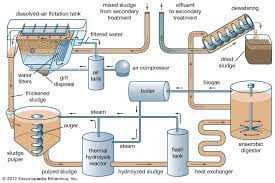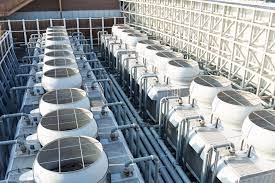Water cooling systems are of two types: One type involves discharging water to a sewer and another type involves recirculation of water, that is, the cooling medium is reused and recycled.
Recirculation Water System
Recirculation water systems are of three types:
- The additive systems
- The open systems
- The closed systems
In the additive cooling systems, make-up water is used to maintain a specific temperature or range of temperature for the cooling.
In open recirculation systems, evaporative cooling process is carried out using cooling tower, evaporative condenser and sump tank or spray pond to remove large amounts of heat with small amounts of water loss.
Read Also: Effects of Biomedical Waste on Health
Closed recirculation system is the most popular method of controlled cooling of water treatment.
In closed recirculation water system, water is circulated in a closed cycle and subjected to alternate cooling and heating without air contact. The heat energy that is absorbed in the closed system is transferred to the recirculating water of an open recirculating system by water-to-water exchanger.

Applications of closed recirculation water system
Closed recirculation water system is used to control temperature in industry. It is also applied in the cooling of gas engines and compressors, diesel engines which use radiator systems, sample coolers in power plants, air conditioning chilled water systems to transfer the refrigerant cooling to air washers, etc.
Read Also: Effects of Biomedical Waste on Health
Advantages of closed recirculating water system
- Better control of temperatures in heat-producing equipments
- Simplified control of potential waterside problems
- Make–up water not needed unless there is leakage or for repairs
- Very little evaporation occurs
- No problem of scale deposits
- No dangers of cracked cylinders, broken heads or other mechanical failures.
- Less susceptible to biological fouling from slime and algae deposits
- Reduced corrosion.
- Reduced wastage of water
- Very convenient.
In conclusion, closed system is the commonest recirculation water system that is used for cooling. The closed recirculation water system has many advantages.

